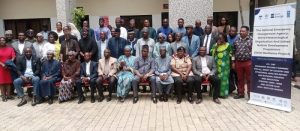The Director-General, National Emergency Management Agency (NEMA), Mrs Zubaida Umar, has emphasised the urgent need for a comprehensive action plan to address disaster risks in Nigeria.

She said this during the Expert Workshop on Early Warning For All, National Disaster Risk Reduction (DRR) Strategic and Action Plan 2023-2030 in Abuja, on Monday, September 2, 2024.
The workshop, according to her, coincided with the ongoing flood season in Nigeria and would provide an opportunity to review the level of preparedness, response, mitigation and long-term recovery strategies.
She added that the initiative stemmed from an assessment by the Overseas Development Institute for the UNDP, which highlighted the necessity of improving DRR strategies in light of escalating disasters such as conflicts and floods.
Umar noted that the Sahel region, where Nigeria is located, faced severe vulnerabilities due to poverty, environmental degradation, and climate change.
“The workshop aims to align Nigeria’s plans with the Sendai Framework and the African Programme of Action to enhance disaster resilience.
“A review of NEMA’s existing plans has indicated an urgent need for a more comprehensive action plan for disaster risk management in Nigeria, considering new and emerging hazards.
“This is to align with the Sendai Framework and African Programme of Action (PoA) to increase disaster resilience and drive sustainable development.
“The current escalations of conflicts, banditry, annual floods, and extreme weather events have triggered the desire to develop this DRR Strategy and Action Plan for Nigeria,” she said.
She further explained that the workshop was part of the Sahel Resilience Project titled “Strengthening Capacities for Disaster Risk Reduction and Adaptation for Resilience in the Sahel Region”.
The project, according to her, aimed to foster risk-informed solutions for sustainable development in the Sahel countries, led by UNDP, African Union Commission, ECOWAS, UN Women, Lake Chad Basin Commission, AGHRYMET, and other regional actors.
She expressed gratitude to international partners, particularly Sweden, for their support in this crucial project.
Umar urged participants to focus on practical disaster prevention strategies and to collaborate effectively over the three-day workshop to develop a robust action plan that extended beyond 2030, ensuring sustainable disaster risk management in Nigeria.
“I have no doubt that the objectives of the workshop will be fully achieved with your valuable professional inputs,” she said.
Mr Abdulrahman Mohammed, acting Director, FCT Emergency Management Department (FEMD), identified stakeholders’ failure to use available data as a major problem confronting early warning on disaster in Nigeria.
Mohammed stressed the need to enforce the use of data made available by NEMA and agencies.
“We need to enforce making sure that we use data, because if we use data, the problem of disaster risk is almost solved,” he said.
By Philomina Attah and Emmanuel Oloniruha
